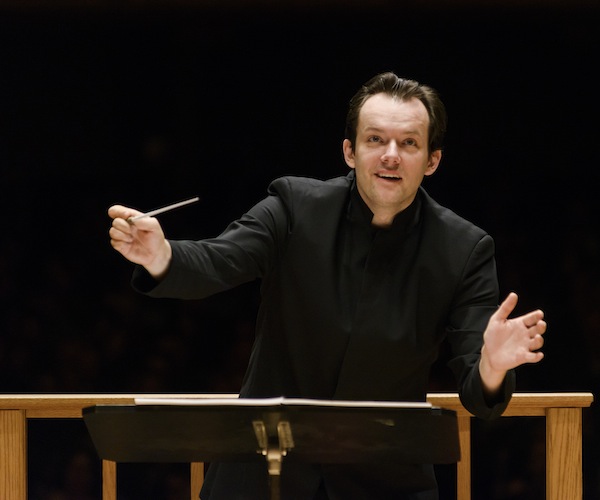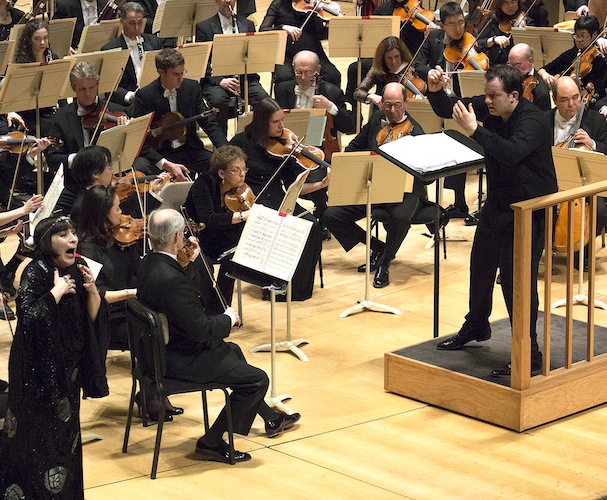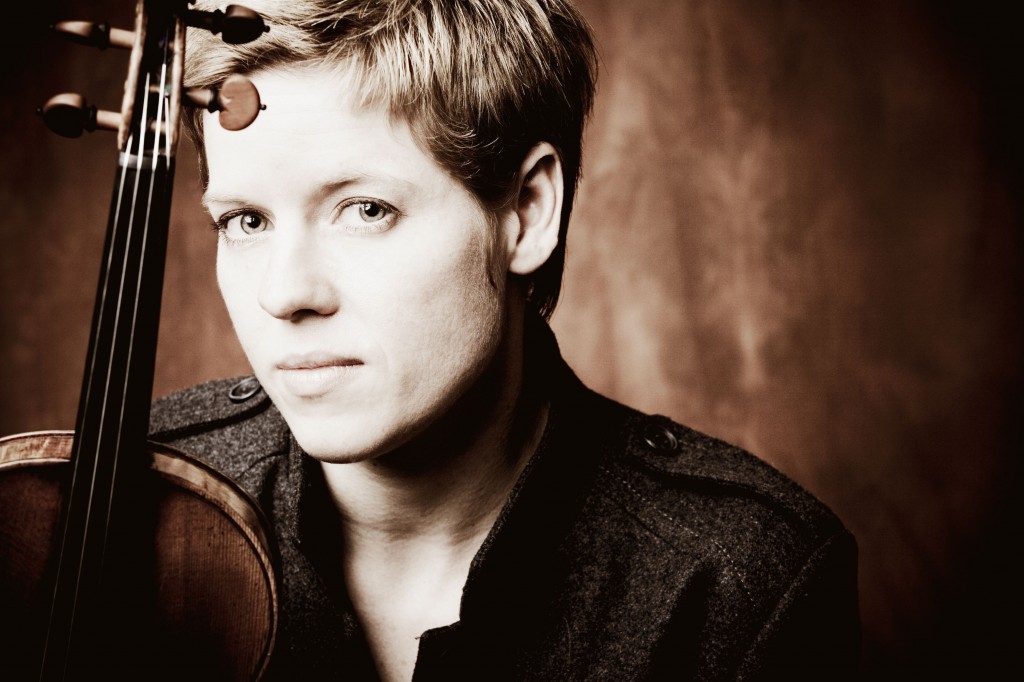Classical Music Commentary: On Andris Nelsons’ First Season in Boston and a Look Ahead at 2015-16
By the end of Andris Nelsons’ inaugural season he had the BSO playing with lots of energy and like they really care, night in and out.

Andris Nelsons leading the Boston Symphony Orchestra. Photo: Liza Voll
By Jonathan Blumhofer
If you’re going to sink or swim on the merits of the standard canon, you may as well make it sound as exciting as you can. That seems to have been the primary rationale behind Andris Nelsons’ first season as music director of the Boston Symphony Orchestra (BSO). On paper, Nelsons’ programming of Wagner, Tchaikovsky, Beethoven, Rachmaninoff, Sibelius, Bruckner, Mozart, Strauss, and Mahler looked depressingly risk-averse. Sometimes it was, but oftentimes the music was lively and electric. Coming on the heels of several leaderless seasons that saw the BSO seeming more and more adrift, musically, perhaps that’s the most impressive takeaway from Nelsons’ inaugural season: by the end of it, he had the BSO playing with lots of energy and like they really care, night in and out.
That’s good, and it bodes well for the future. Counting his inaugural gala, I caught six of Nelsons’ ten programs with the orchestra this season at Symphony Hall (the rest I heard via the orchestra’s Concert Broadcast Streams). Looking back on them, there weren’t too many surprises. As nearly every critic has noted, Nelsons is a dynamic, energetic podium presence. His movements often aren’t the most graceful to watch, but his brand of kinetic leadership is something that the BSO has seemed to respond to particularly well this year.
Still, as Lloyd Schwartz has been quick to point out these past several months, excitement and energy don’t necessarily equal musical insight. And, as an interpreter, there is a fair amount of room for Nelsons to grow.
Overall, he seems most fully formed in Slavic fare. That’s not especially surprising, given that Nelsons hails from Latvia and is a protégé of Mariss Jansons, a specialist in that repertoire (and much else). Nelsons’ account of Tchaikovsky Pathétique Symphony in October was probably the finest performance he has led with the BSO thus far, though I also really liked his Shostakovich Tenth Symphony in April and the BSO’s recording of his Sibelius Second Symphony (taped in November) was by no means shabby. There was also a terrific account of Rachmaninoff’s The Bells just before Thanksgiving and a fine performance of Sofia Gubaidulina’s Offertorium earlier that month. His reading of Bartók’s Miraculous Mandarin Suite in October was equal parts snappy and scary. Among his Austro-Germanic successes, I’m still in awe of the mesmeric realization of Beethoven’s Violin Concerto that Nelsons and Christian Tetzlaff pulled off in April. And I liked his and the BSO’s genial approach to Haydn’s Symphony no. 90 in January, too.
Nelsons’ grasp of other repertoire this season, though, was mixed. He led a solid account of Bruckner’s Seventh Symphony in January, but his readings of Strauss tone poems (Don Quixote and Ein Heldenleben) were micromanaged and tended to loose sight of the music’s overarching narrative. Nelsons’ Mahler Sixth in March was thrilling in its intensity and bluster but frustrating in how it undercut the dramatic structure and payoff – one of the greatest such moments in the symphonic canon – in the finale. Much of his opening night gala in September, especially whole sections of the Overture to Tannhäuser (which, for artistic reasons I cannot divine, was included on Nelsons’ BSO debut album) and the Prelude to Tristan und Isolde, plodded: there was next to no sense of forward momentum, passion, or excitement. I found Nelsons’ Mozart concerti on the whole too genteel, though the slow movements did sing and the finale of the B-flat major Piano Concerto he led with Richard Goode in April sparkled. Stravinsky’s Rite of Spring, Tchaikovsky’s Hamlet, and Beethoven’s Eighth Symphony lacked, respectively, rhythmic exactitude, heart (though some of the blame for that lies with Tchaikovsky), and humor.

BSO Music Director Andris Nelsons leads the orchestra in “Salome” with soprano Gun-Brit Barkmin, who will be performing in the BSO’s “Electra” next season. Photo: Stu Rosner.
As for the new music front, Nelsons has seemed reluctant either to plant a flag or shake things up. That’s a shame, because the contemporary scores I’ve heard him conduct in person – Brett Dean’s Dramatis personae, Michael Gandolfi’s Ascending Light, and Gunther Schuller’s Dreamscape at Symphony Hall, and Christopher Rouse’s Rapture at Tanglewood – have all been led with assurance. (Nelsons’ Gubaidulina and the Harbison/Esenvalds portion of his last November program exhibited the same characteristics over the airwaves.) That he’s no Gustavo Dudamel or Alan Gilbert when it comes to contemporary music is, again, not much of a surprise – Nelsons’ programs in Birmingham never really thrived on being cutting-edge – though one hopes that he will become bolder and more willing to focus his efforts on new music over time.
More crucially, I trust that he will broaden the quality of the premieres he brings to Symphony Hall. Both the Dean and Gandolfi concerti have their share of major problems – the former is tendentious and thin in content; the latter, though competently written and very much a crowd-pleaser, lacks novelty, freshness, and adventure – and it’s perhaps telling that the season’s best premiere of any kind (Harrison Birtwistle’s Responses: sweet disorder and the carefully careless) was led not by Nelsons but by Stefan Asbury (stepping in for Vladimir Jurowski). Next season rectifies this trend a bit (see below) but only time will tell where Nelsons’ focus and priorities lie.
Concepts for some individual programs Nelsons conducted, like his April Beethoven/Shostakovich pairing, were strong. Others seemed more haphazard. There was a kind of get-to-know-the-new-music-director feel to most of Nelsons’ weeks with the orchestra that, considering his abbreviated time in front of local audiences, was probably a good idea.
But the whole season lacked an overarching plan and, to these ears, didn’t really add up to more than the sum of its parts. There’s much the BSO might do to better unify its offerings and tie them in with cross-disciplinary going’s-on about the city – at, say, the MFA or ICA or Boston Public Library. James Levine’s programs with the orchestra tended to be more intentionally intellectual, which was both one of the greatest assets of his tenure and, owing to Levine’s preference for one style of contemporary music over many others, their biggest drawback. Nelsons would perhaps do well to embrace some of Levine’s programming rigor and daring while, at the same time, broadening his own niche in the repertoire: he could mine some fascinating connections between Eastern and Western European musics and draw upon some less-familiar works (especially Slavonic) that could enliven his next several seasons with the BSO.
===========================
As for the BSO’s 2015-16 season, which was announced during Nelsons’ spring residency, it plays to many of the music director’s strengths. There’s lots of Russian music and a couple of themes running through it – notably the BSO’s new Shostakovich recording project and commemorations of the 400th anniversary of Shakespeare’s death in 2016. Calling it adventuresome would be a bit of a stretch, but it does include some welcome doses of new and recent music: Sebastian Currier’s Divisions comes in October; Unsuk Chin’s Mannequin (an American premiere) and Jean-Frederic Neuburger’s Aube in November; Hans Abrahamsen’s let me tell you and George Tsontakis’ Sonnets (a world premiere) are part of the February Shakespeare celebrations, as is a revival of Hans Werner Henze’s BSO-commissioned Symphony no. 8, not heard here since 2001; Giya Kancheli’s Dixi receives its American premiere in March, during which month works by Jennifer Higdon and John Williams also crop up. Music by Henri Dutilleux, who would have turned 100 in 2016, is always welcome and some major scores appear periodically during the New Year (Le Temps l’Horloge in January; Timbres, espace, movements in February; and Métaboles in April).
As for the BSO’s overreliance on its favorites from the repertoire’s core fifty-or-so pieces, next season brings a bit of a reprieve. Yes, there’s an excess of Beethoven (with four of the piano concertos and three of the symphonies), Brahms’s Symphony no. 2 returns for the fifth time since 2010, and the Saint-Saens Organ Symphony reappears after just a couple of seasons off. But there’s some great, rarer stuff to be heard, too: Bartók’s Music for Strings, Percussion, and Celesta and Berg’s shattering Violin Concerto turn up in November; Debussy’s Jeux and Bohuslav Martinů’s Symphony no. 6 appear in January; Dvorak’s Othello Overture, Richard Strauss’ Macbeth, and Karl Amadeus Hartmann’s Concerto funebre for string quartet and orchestra are on the docket in February; and Mozart’s marvelous Sinfonia concertante for violin and viola comes in April (along with Bruckner’s seldom-heard Symphony no. 3).
Among the Russian fare, highlights include three Shostakovich symphonies – the Fifth, Eighth, and Ninth (the latter hasn’t been played by the BSO since 1962) – and the Incidental Music to Hamlet, all of which are set to be recorded for the BSO’s new Shostakovich semi-cycle with Deutsche Grammophon. Other standout works include Tchaikovsky’s vastly underrated Symphony no. 1 and the Letter Scene from Eugene Onegin (featuring Nelsons’ wife, soprano Kristine Opolais); music from Prokofiev’s Romeo and Juliet and the Alexander Nevsky Cantata; the 1911 version of Stravinsky’s Petrushka; and Rachmaninoff’s Symphonic Dances.

The excellent violinist Isabel Faust will perform Berg’s Violin Concerto with the Boston Symphony Orchestra next season. Photo: Marco Borggreve
There are also two full operas on tap for the fall and spring. Nelsons conducts a concert performance of Strauss’ Elektra in October. For it, he brings back several of the same singers who triumphed in his wild Salome of March 2014: Gun-Brit Barkman sings Chrysothemes, Jane Henschel is Klytemnestra, and Gerhard Siegel portrays Aegsith; Christine Goerke takes on the title role. This time, too, there will be two performances, not just one. Then, in March, Charles Dutoit follows up his terrific account of Ravel’s L’Enfant et le sortilèges from 2013 with the French master’s other short opera, L’Heure espagnole. Daniela Mack, Benjamin Hulett, Francois Piolino, Jean-Luc Ballestra, and David Wilson-Johnson take the singing roles in that production.
As usual, several major soloists are scheduled to appear with the BSO, starting with Evgeny Kissin playing Tchaikovsky’s Piano Concerto no. 1 in October. Other pianists include Paul Lewis (playing Beethoven) in October; Louis Lortie (Liszt), Martin Helmchen (Beethoven), and Yefim Bronfman (Bartók) in November; Javier Perianes (Falla), Garrick Ohlsson (Beethoven), and Nikolai Lugansky (Rachmaninoff) in March, and Murray Perahia (Beethoven) in April. Pinchas Zuckerman plays and directs works by Tchaikovsky, Elgar, and Schubert in October. The excellent Isabelle Faust is featured in Berg’s Violin Concerto and Johannes Moser performs the Dvorak Cello Concerto in January. The New Year also brings two major singers in their respective primes: Renee Fleming sings Dutilleux and Canteloube in January while, in February, the charismatic Barbara Hannigan makes her BSO debut.
Several BSO principal players also take turns in the solo spotlight: Elizabeth Rowe and Jessica Zhou play Mozart in January; Robert Sheena premieres the new Tsontakis English horn concerto in February; and Malcolm Lowe and Steven Ansell are featured in the Mozart Sinfonia concertante in April.
On the whole, there are quite a few things to anticipate; the upcoming season suggests a more thoughtful approach to planning on Nelsons’ part.
============================
So, what to conclude from the first year of the Nelsons era? Primarily this: Nelsons’ gifts are formidable and the glimpses of them that came across this past season promise wonderful things. But both he and the BSO would benefit from a less peripatetic coexistence. Nelsons’ honeymoon with the orchestra and its audience may go on for awhile yet; even so, it’s high time conductor and ensemble have the opportunity to buckle down and spend some extended, quality time together. As in any marriage, they need to let their relationship deepen and mature.
Jonathan Blumhofer is a composer and violist who has been active in the greater Boston area since 2004. His music has received numerous awards and been performed by various ensembles, including the American Composers Orchestra, Kiev Philharmonic, Camerata Chicago, Xanthos Ensemble, and Juventas New Music Group. Since receiving his doctorate from Boston University in 2010, Jon has taught at Clark University, Worcester Polytechnic Institute, and online for the University of Phoenix, in addition to writing music criticism for the Worcester Telegram & Gazette.
